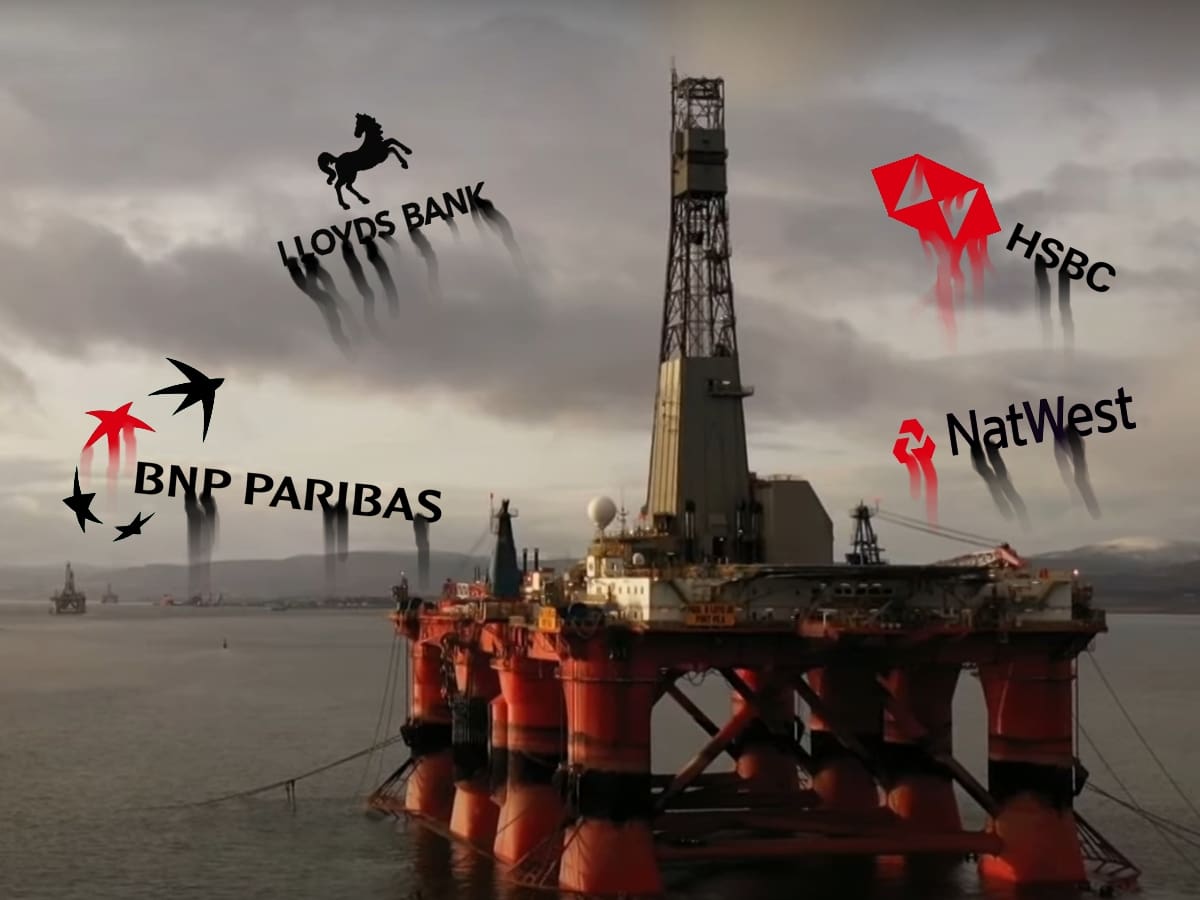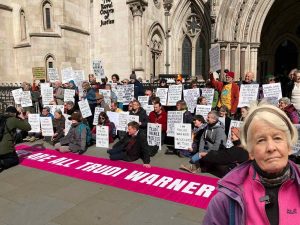Since Israel began its relentless genocidal siege on Gaza, campaign groups and media outlets, including the Canary, have been documenting the explicit intersections between the climate crisis and Israel’s settler colonial ambitions. Now, a coalition of over 80 non-profits is laying some of the blame at the feet of major international banks – for both charges. And it all revolves around the climate catastrophic Rosebank project in the North Sea.
Banks financing Rosebank climate disaster
On Wednesday 20 March, over 80 organisations wrote to the CEOs of 12 major banks calling on them to stop financing the minority owner of the gargantuan climate-wrecking Rosebank project. The organisations include the likes of Make My Money Matter, Greenpeace UK, Global Witness, Rainforest Action Network, Future in our Hands, Reclaim Finance, and more.
In September 2023, the UK government gave the North Sea oil and gas project the greenlight. Norwegian fossil fuel giant Equinor has an 80% interest in the project. Meanwhile, Israeli Delek Group’s subsidiary Ithaca Energy holds the remainder.
As the Canary previously reported, campaigners have estimated that Rosebank will:
produce nearly 500m barrels of oil and generate more carbon emissions over its lifetime than the annual CO2 output of the 28 lowest-income countries combined.
However, this hasn’t stopped some of the largest international financial institutions from providing their support. Specifically, the coalition found that between 2016 and 2022, the twelve banks in question financed Ithaca Energy to the tune of $2.9 billion. These banks are:
- HSBC (provided $59.7m).
- Lloyds (provided $78m).
- Natwest (provided $78m).
- BNP Paribas (provided $1.87bn).
- Bank of America (provided $59.7m).
- Deutsche Bank (provided $78m).
- DNB (provided $78m).
- Goldman Sachs (provided $59.7m).
- ING (provided $78m).
- JPMorgan Chase (provided $249.8m).
- Morgan Stanley (provided $137.8m).
- Wells Fargo (provided $78m).
Fossil fuels despite climate commitments
Of course, major financial institutions funding fossil fuels is nothing new. The annual Banking on Climate Chaos report – which the coalition used for its research – has previously revealed that banks are routinely investing in big oil and gas.
Naturally, this is despite many having climate pledges, such as membership of the Net Zero Banking Alliance NZBA. A finance industry alliance set up this key climate initiative at the 2021 COP26 in Glasgow. Membership means that banks must bring their financed and facilitated emissions in line with the 1.5°c degree goal of the Paris Climate Agreement.
What’s more, the NZBA commits companies to transition away from fossil fuels, towards green energy.
Significantly, eleven of the banks funding Ithaca are members of the Net Zero Banking Alliance (NZBA).
However, Ithaca Energy is a ‘pure play’ fossil fuel company – meaning that it focuses exclusively on oil and gas. It has a major hand in two of the three largest and most significant expansion projects in the North Sea. Because it does not develop renewable energy, Ithaca Energy has no viable means to facilitate a transition away from fossil fuels.
Again, the financing of Ithaca by NZBA members is in step with former findings on banks’ consistent failure to align with their supposed emissions commitments. Notably, a report from 2023 previously criticised members of the NZBA for continuing to finance fossil fuels.
Stop Rosebank campaigner Lauren MacDonald commented:
Rosebank is the poster child for North Sea oil and gas expansion, so why are these banks – some of whom say they no longer support new fossil fuel projects – providing billions to its minority owner, who has no plans to dial down oil and gas drilling?
Climate-wreckers to financiers of genocide
And if financing a climate-wrecking carbon disaster wasn’t enough, the banks could also be complicit in propping up Israel’s apartheid and genocidal occupation in Palestine.
Crucially, Ithaca Energy is a subsidiary of the Israeli oil and gas giant Delek Group.
The letter noted that the UN has featured Delek on its list of 112 companies operating in Israeli settlements in the Occupied Palestinian Territories.
In particular, this list records corporations in settlements that are regarded as illegal under international law. Therefore, the letter highlighted that the UN human rights office considers that these are companies engaged in activities “that raised particular human rights concerns”.
On top of this, Delek Group is also involved in the extraction of oil and gas from disputed maritime areas of the Levant Basin.
Meanwhile, the company is additionally a shareholder of Delek Israel Fuel. The subsidiary operates various gas and service stations in and around Israeli settlements. Perhaps most significantly, it supplies fuel to various arms of the Israeli occupation forces. As a result, the letter explained that:
The company is included in the UN Database because its services are supporting the maintenance and existence of settlements.
So, Delek’s operations in the Occupied Palestinian Territories is particularly salient in light of Israeli settler’s escalation of violence towards Palestinians in the Occupied West Bank.
Between 7 October and 31 December 2023, Israel killed 299 Palestinians in the West Bank. According to the UN, this was a 50% increase on the previous nine months of the year.
Rosebank: underpinning settler colonialism
The letter also comes a week ahead of Ithaca’s 2023 full year profits on 27 March. In February, Novara Media revealed that Ithaca paid out $266m in dividends during the first three-quarters of 2023. It pointed out that this was part of its targeted $400m for the full year.
Notably, Novara detailed how $355m of the target figure would go to fossil fuel giant Delek Group, since it owns the majority – 88.5% – of shares in the company.
Of course, this is financing Delek’s operations in the Occupied Palestinian Territories. As such, Ithaca’s profits are underpinning Israel’s settler colonial project in Palestine.
Ultimately then, the letter demonstrates that averting the climate crisis and fomenting the liberation of Palestine are intrinsically linked. Importantly, the stakes of stopping Rosebank are ever greater as Israel continues its ceaseless and unrepentant genocide in Gaza.
The banks financing this catastrophic fossil fuel project are complicit in both the climate crisis and Israel’s genocide of Palestine. Colonialism and extractive capitalism were always two sides to the morally bankrupt imperial status quo.
Feature image via Sky News/Youtube.




